Homo neanderthalensis - Study guides, Study notes & Summaries
Looking for the best study guides, study notes and summaries about Homo neanderthalensis? On this page you'll find 75 study documents about Homo neanderthalensis.
Page 2 out of 75 results
Sort by
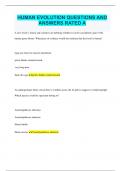
-
HUMAN EVOLUTION QUESTIONS AND ANSWERS RATED A
- Exam (elaborations) • 8 pages • 2023
- Available in package deal
-
- R187,97
- + learn more
HUMAN EVOLUTION QUESTIONS AND ANSWERS RATED A A new fossil is found, and scientists are debating whether it can be considered a part of the human genus Homo. What piece of evidence would best indicate that the fossil is human? large jaw bone for muscle attachment pelvic blades rotated inward very long arms thick rib cage pelvic blades rotated inward An anthropologist finds a fossil that is 4 million years old. Its pelvis suggests it walked upright. Which species could the specimen belong to...
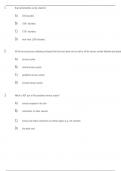
-
Test Bank for an Introduction to Brain and Behavior 5th Edition Bryan Kolb
- Exam (elaborations) • 163 pages • 2023
-
- R347,91
- + learn more
Test Bank for an Introduction to Brain and Behavior 5th Edition Bryan Kolb 1. Brain abnormalities can be related to: A) B) C) D) 500 disorders. 1000 disorders. 1500 disorders. more than 2,000 disorders. 2. All the nerve processes radiating out beyond the brain and spinal cord as well as all the neurons outside the brain and spinal cord constitute the: A) B) C) D) nervous system. central nervous system. peripheral nervous system. external nervous system. 3. Which is NOT part of the peripher...
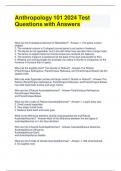
-
Anthropology 101 2024 Test Questions with Answers
- Exam (elaborations) • 6 pages • 2024
- Available in package deal
-
- R253,83
- + learn more
Anthropology 101 2024 Test Questions with Answers What are the 6 skeletal evidences for Bipedalism? - Answer-1. The pelvis is bowl shaped. 2. The vertebral column is S-shaped (curved spine to set center of balance). 3. The big toe is not opposable, but in line with other toes (we also have a larger heel). 4. The femur is angled inward so that the knees are centered (for balance). 5. The foramen magnum is positioned at the base of the skull and parallel to floor. 6. Relative arm and leg len...
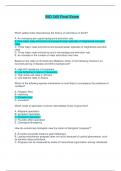
-
BIO 345 Final Exam | Questions and Answers (Complete Solutions)
- Exam (elaborations) • 18 pages • 2024
-
- R376,14
- + learn more
BIO 345 Final Exam | Questions and Answers (Complete Solutions) Which pattern best characterizes the history of extinctions on Earth? A. An increasing per capita background extinction rate B. Five major mass extinctions and several lesser episodes of heightened extinction rates C. Three major mass extinctions and several lesser episodes of heightened extinction rates D. Three major mass extinctions and a low background extinction rate E. An increase in the number of mass extinctions over time...
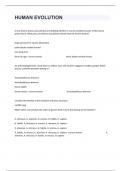
-
HUMAN EVOLUTION Study Guide Exam Verified & Accurate Answers For Guaranteed Pass| Graded A+.
- Exam (elaborations) • 5 pages • 2024
- Available in package deal
-
- R244,42
- + learn more
A new fossil is found, and scientists are debating whether it can be considered a part of the human genus Homo. What piece of evidence would best indicate that the fossil is human? large jaw bone for muscle attachment pelvic blades rotated inward very long arms thick rib cage - correct answer pelvic blades rotated inward An anthropologist finds a fossil that is 4 million years old. Its pelvis suggests it walked upright. Which species could ...
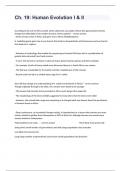
-
Ch. 19: Human Evolution I & II Questions With Explanations Of Answers.
- Exam (elaborations) • 8 pages • 2024
- Available in package deal
-
- R244,42
- + learn more
According to the out-of-Africa model, which statement accurately reflects the approximate hominin lineage that ultimately led to modern humans, Homo sapiens? - correct answer - Homo erectus arises in Africa and gives rise to Homo heidelbergensis H. heidelbergensis gives rise to one branch that leads to Neanderthals and Denisovans and one branch that leads to H. sapiens - Advances in technology that enable the sequencing of ancient DNA have led t...
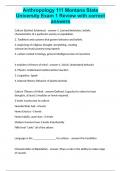
-
Anthropology 111 Montana State University Exam 1 Review with correct answers
- Exam (elaborations) • 14 pages • 2024
-
- R187,97
- + learn more
Culture (Earliest Evidences) - answer-1. Learned behaviors, beliefs, characteristics of a particular society or population. 2. Traditions and customs that govern behavior and beliefs. 3. beginning of religious thought, storytelling, creating science/art/music/poetry/song/speech 4. culture rooted in biology, general intelligence/size of neocortex 4 modules of theory of mind - answer-1. Social: Understand behavior 2. Physics: Understand motion/action/reaction 3. Linguistics: Speak 4. Nat...

-
ANT3514C_ Introduction to Biological Anthropology.-University of Florida, Exam 3. Score for this Quiz: 100 out of 100.
- Exam (elaborations) • 27 pages • 2023
-
- R225,61
- + learn more
ANT3514C_ Introduction to Biological Anthropology. Exam 3. Score for this quiz: 100 out of 100. All species of the genus Homo are bipedal. True Question 2 1 / 1 pts All species of the genus Homo are known to have a sagittal crest.False Question 3 0 / 1 pts Upper Paleolithic modern humans in Europe developed Mousterian tools. True False Question 4 1 / 1 pts Monogamy is unique to humans and no other species of non-human primate.False Question 5 1 / 1 pts Acheulean bifacial hand axes are associated...
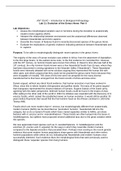
-
ANT 3514C – Introduction to Biological Anthropology Lab 11: Evolution of the Genus Homo: Part II
- Exam (elaborations) • 11 pages • 2023
-
- R197,38
- + learn more
Lab Objectives: Assess the morphological variation seen in hominins during the transition to anatomically modern Homo sapiens (AMH). Interpret the relationship between environment and the anatomical differences observed between Neandertals and Homo sapiens. Describe the mosaic of features found in recently discovered species of the genus Homo. Evaluate the implications of genetic evidence indicating admixture between Neandertals and H. sapiens. Purpose: To be able to morp...
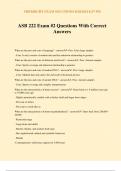
-
ASB 222 Exam #2 Questions With Correct Answers
- Exam (elaborations) • 11 pages • 2024
- Available in package deal
-
- R235,01
- + learn more
ASB 222 Exam #2 Questions With Correct Answers What are the pros and cons of language? - answer- Pros: It has large samples - Cons: It only consists of modern data and has unknown relationship to genetics What are the pros and cons of skeletons and fossils? - answer- Pros: Ancient samples - Cons: Spotty coverage and unknown relationship to genetics What are the pros and cons of modern DNA? - answer- Pros: Large samples - Cons: Modern data only and is the end result of historical process ...

How much did you already spend on Stuvia? Imagine there are plenty more of you out there paying for study notes, but this time YOU are the seller. Ka-ching! Discover all about earning on Stuvia


